
Enchanting Old Quebec: A Journey Through Time
Old Quebec, located in the heart of Quebec City, Canada, is a beautifully preserved historic district that transports visitors back to the 17th century. This UNESCO World Heritage site is known for its charming cobblestone streets, European architecture, and vibrant cultural scene. As you stroll through the narrow lanes, you'll discover the rich history and unique character that make Old Quebec a must-visit destination. The neighbourhood is divided into two main areas: Upper Town and Lower Town. Upper Town is home to iconic landmarks such as the Fairmont Le Château Frontenac, a grand hotel that dominates the skyline, and the Dufferin Terrace, where you can enjoy stunning views of the St. Lawrence River. Lower Town, on the other hand, boasts the picturesque Place Royale and the bustling Quartier Petit Champlain, one of North America's oldest commercial districts. Old Quebec is not just about history; it also offers a plethora of shops, cafes, and restaurants where you can indulge in local delicacies and find unique souvenirs. The neighbourhood's lively atmosphere is complemented by seasonal events, including the famous Winter Carnival and summer music festivals, ensuring there's always something exciting happening. Whether you're a history buff, a foodie, or simply looking to soak in the old-world charm, Old Quebec promises an unforgettable experience.
Local tips in Old Quebec
- Wear comfortable walking shoes as the cobblestone streets can be uneven.
- Visit early in the day to avoid crowds, especially at popular sites like Château Frontenac.
- Try local specialties like poutine and maple syrup treats at nearby cafes.
- Take a guided walking tour to learn about the rich history and hidden gems of Old Quebec.
- Check the event calendar for seasonal festivals and plan your visit accordingly.
Enchanting Old Quebec: A Journey Through Time
Old Quebec, located in the heart of Quebec City, Canada, is a beautifully preserved historic district that transports visitors back to the 17th century. This UNESCO World Heritage site is known for its charming cobblestone streets, European architecture, and vibrant cultural scene. As you stroll through the narrow lanes, you'll discover the rich history and unique character that make Old Quebec a must-visit destination. The neighbourhood is divided into two main areas: Upper Town and Lower Town. Upper Town is home to iconic landmarks such as the Fairmont Le Château Frontenac, a grand hotel that dominates the skyline, and the Dufferin Terrace, where you can enjoy stunning views of the St. Lawrence River. Lower Town, on the other hand, boasts the picturesque Place Royale and the bustling Quartier Petit Champlain, one of North America's oldest commercial districts. Old Quebec is not just about history; it also offers a plethora of shops, cafes, and restaurants where you can indulge in local delicacies and find unique souvenirs. The neighbourhood's lively atmosphere is complemented by seasonal events, including the famous Winter Carnival and summer music festivals, ensuring there's always something exciting happening. Whether you're a history buff, a foodie, or simply looking to soak in the old-world charm, Old Quebec promises an unforgettable experience.
Iconic landmarks you can’t miss
The Citadelle of Québec
Discover the Citadelle of Québec, a historic fortress and museum that offers breathtaking views and engaging insights into Canada's military heritage.
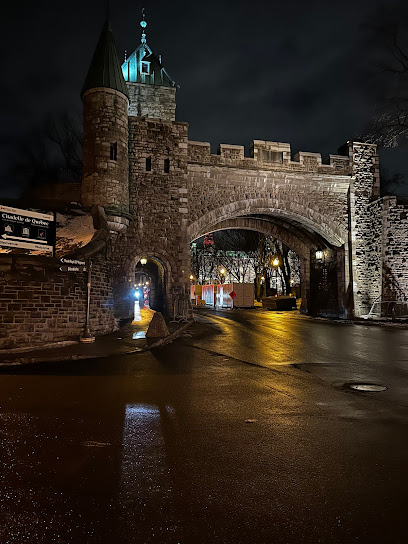
Quartier Petit Champlain
Explore the historic Quartier Petit Champlain, a vibrant shopping district in Quebec City filled with unique boutiques, art, and delightful eateries.
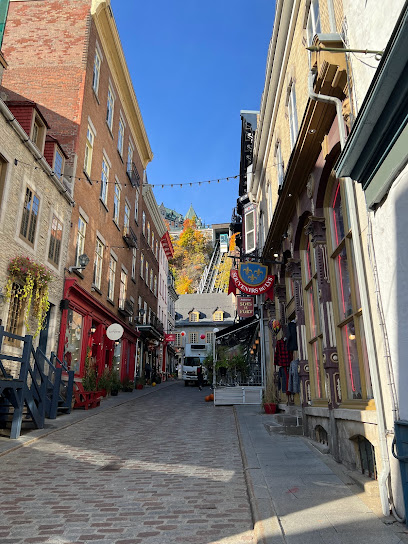
Place Royale
Explore the historic charm of Place Royale in Quebec City, where cobblestone streets meet stunning architecture and vibrant culture.
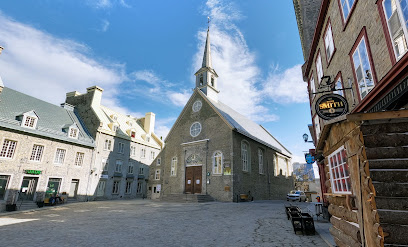
Place d'Armes
Experience the history and charm of Québec City in Place d'Armes, a vibrant square surrounded by iconic landmarks and cultural attractions.
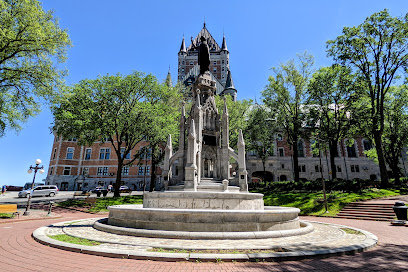
St. Louis Gate
Discover the historic charm of St. Louis Gate, an iconic entrance to Old Quebec that offers a glimpse into the city's rich heritage and stunning architecture.
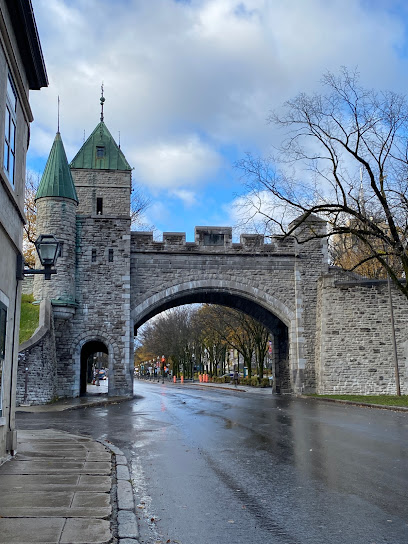
Artillery Park
Explore over 250 years of military history at this National Historic Site in the heart of Old Québec, featuring restored buildings and captivating exhibits.
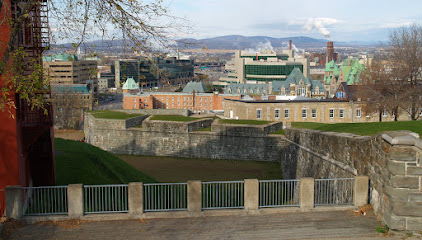
Place de l'Hôtel de Ville
Experience the history and charm of Quebec City at Place de l'Hôtel de Ville, a vibrant square surrounded by stunning architecture and cultural landmarks.
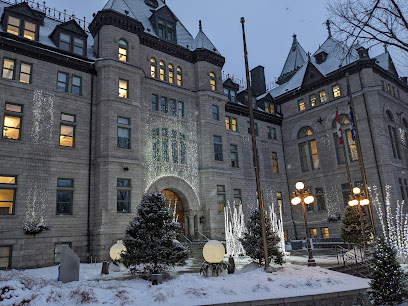
Saint-Louis Forts and Châteaux National Historic Site
Discover the echoes of Quebec's past at Saint-Louis Forts and Châteaux National Historic Site, a stunning historical landmark steeped in colonial history.
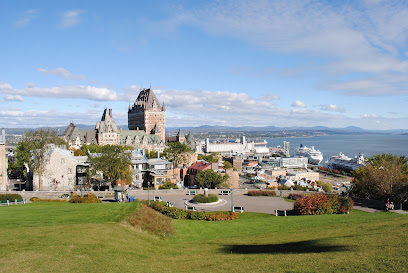
Terrasse Saint-Denis
Experience breathtaking views and rich history at Terrasse Saint-Denis, a charming landmark in the heart of Old Quebec. A perfect spot for relaxation and culture.
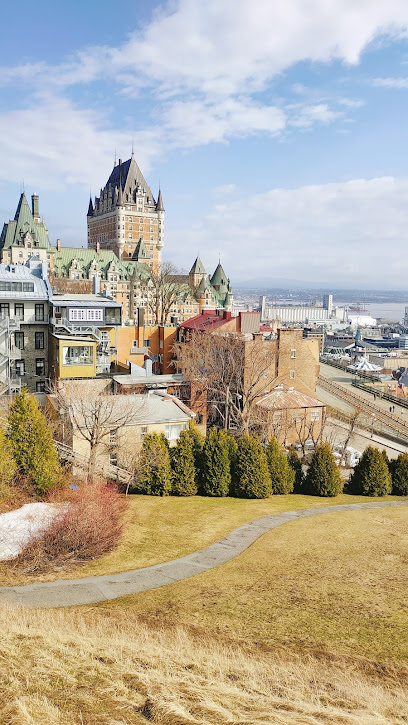
Fountain Monument of Faith
Explore the enchanting Fountain Monument of Faith in Quebec City, a serene symbol of spirituality amidst stunning architecture and rich history.
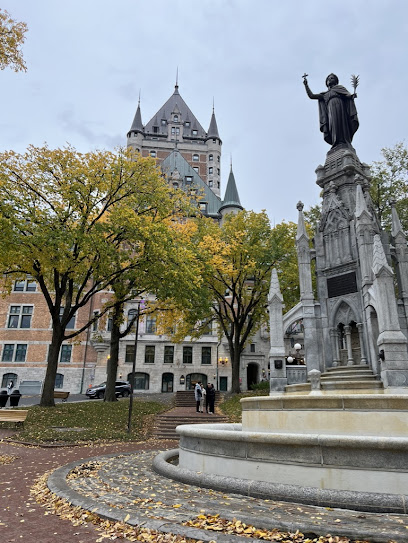
Old Quebec City
Discover the rich history, stunning architecture, and vibrant culture of Old Quebec City, a UNESCO World Heritage Site perfect for every traveler.
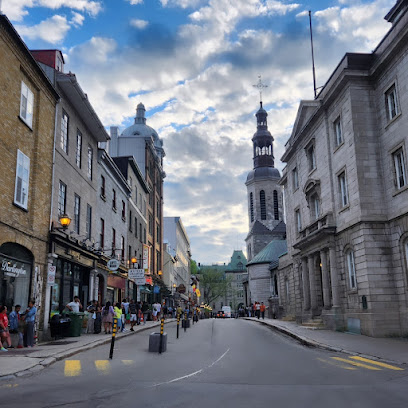
Unmissable attractions to see
Quartier Petit Champlain
Explore the enchanting Quartier Petit Champlain, a historic treasure of Quebec City filled with unique shops, delightful eateries, and vibrant culture.
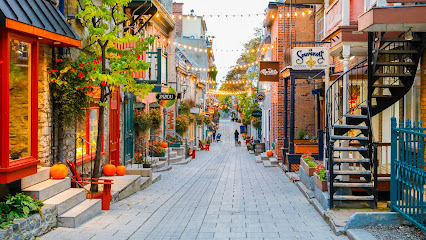
Place d'Armes
Experience the historical charm and vibrant atmosphere of Place d'Armes, a must-visit destination in the heart of Québec City.
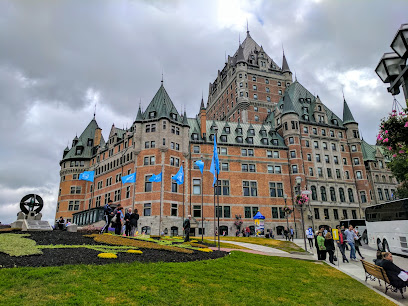
Essential places to dine
Restaurant La Buche
Experience authentic Québécois cuisine at Restaurant La Buche in Quebec City – where tradition meets taste in every dish.
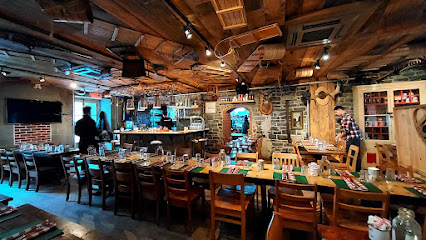
Cochon Dingue Champlain
Experience authentic French cuisine at Cochon Dingue Champlain in Québec City - where local flavors meet culinary excellence.
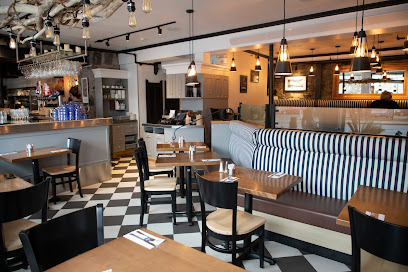
Le Chic Shack
Discover gourmet burgers crafted with local ingredients at Le Chic Shack in Québec City—where flavor meets casual elegance.
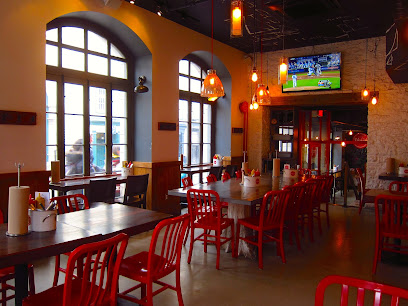
Le Lapin Sauté
Experience authentic French cuisine at Le Lapin Sauté in Québec City's enchanting Petit Champlain district.
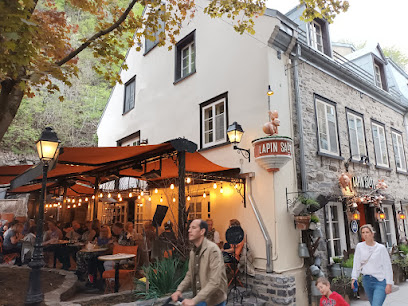
Aux Anciens Canadiens
Discover authentic Quebecois cuisine at Aux Anciens Canadiens in Quebec City—where tradition meets modernity in every delectable dish.
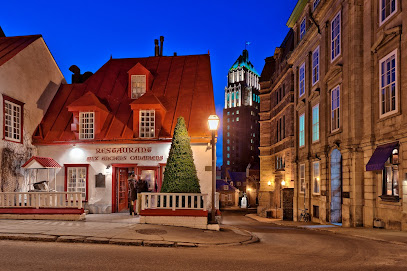
L'Entrecôte Saint-Jean
Experience authentic French cuisine at L'Entrecôte Saint-Jean – where every meal is a celebration of flavor in the heart of Québec City.
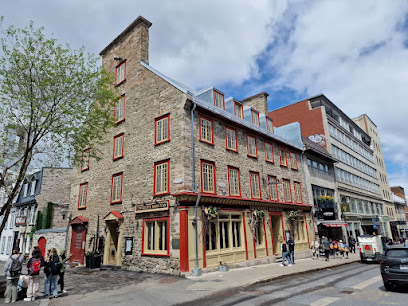
1640 Bistro
Discover 1640 Bistro: A hidden gem in Quebec City offering delectable Canadian cuisine and an inviting atmosphere perfect for all occasions.
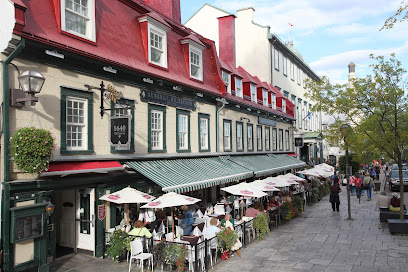
Q-DE-SAC RESTO PUB
Discover delicious burgers and gourmet pizzas at Q-DE-SAC RESTO PUB in Québec City – where culinary excellence meets vibrant atmosphere.
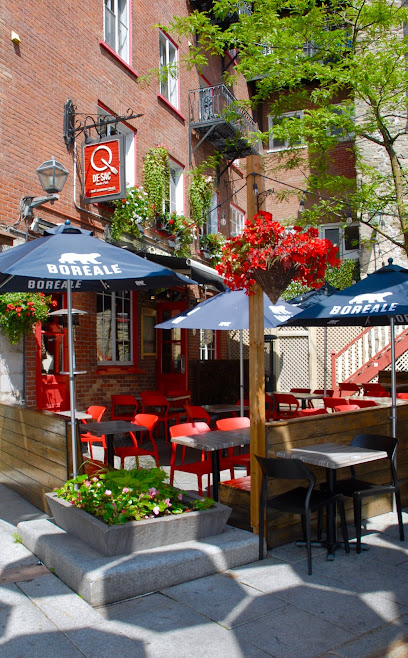
Restaurant Sagamité
Discover authentic Native American cuisine at Restaurant Sagamité in Quebec City—where every bite tells a story.
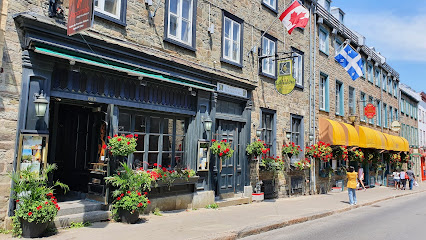
Bistrot Pape Georges (Le)
Experience the vibrant atmosphere and exquisite cuisine at Bistrot Pape Georges in the heart of Québec City.
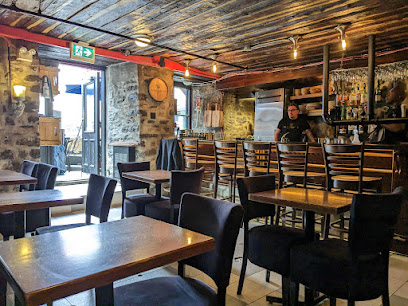
Markets, malls and hidden boutiques
Magasin Général P L Blouin - Gift Shop - Souvenirs - Maple Syrup - Novelty T-Shirts - Record Shop
Discover the charm of Québec City at Magasin Général P L Blouin, your go-to shop for unique souvenirs, art, and local collectibles.
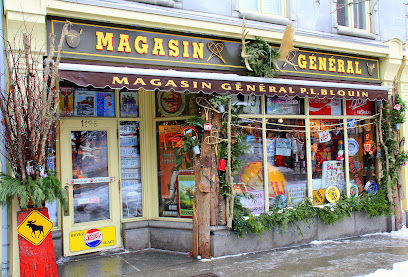
Boutique La Chasse-galerie
Explore Boutique La Chasse-galerie, a unique craft store in Québec City offering artisanal treasures and local artistry for every traveler.
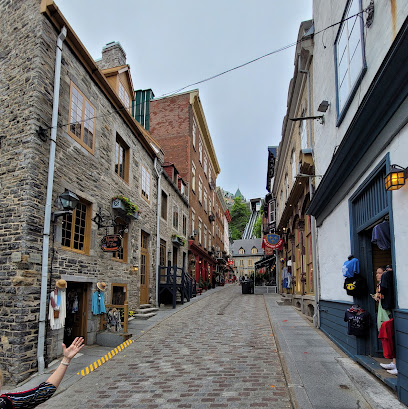
Boutique Feejos
Discover unique local crafts and souvenirs at Boutique Feejos, a charming gift shop in the heart of Quebec City.
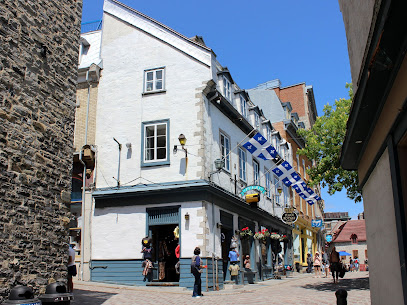
Boutique Stadacone
Explore Boutique Stadacone, a charming gift shop in Québec City, offering unique souvenirs and local crafts that capture the essence of your travels.
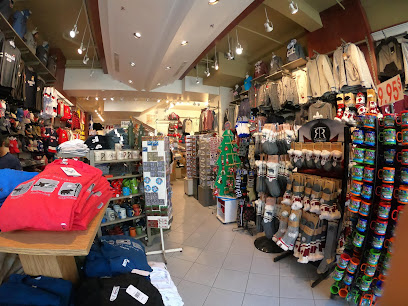
Magasin P.A. Gagnon
Explore the unique gifts and local treasures at Magasin P.A. Gagnon, the perfect spot for souvenirs in historic Québec City.
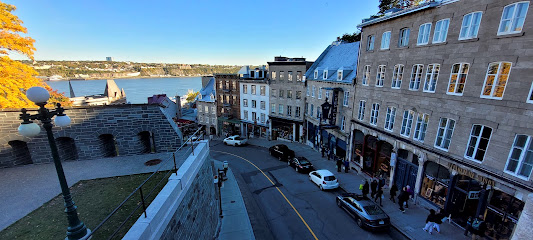
Boutique Expression
Explore Boutique Expression in Québec City for unique gifts and locally crafted treasures that embody the spirit of the region.
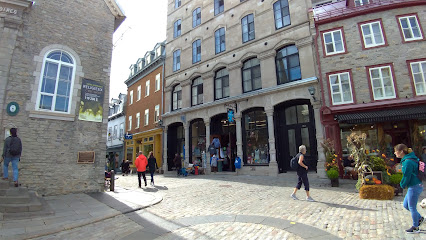
Boutique Leonard
Discover the essence of Québec culture at Boutique Leonard, a charming souvenir store with unique, handcrafted treasures.
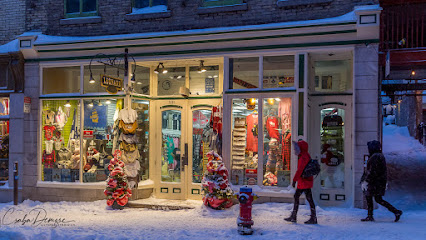
Boutique du Lys
Explore Boutique du Lys, a charming clothing store in Quebec City, offering unique fashion pieces and personalized service amidst historical beauty.
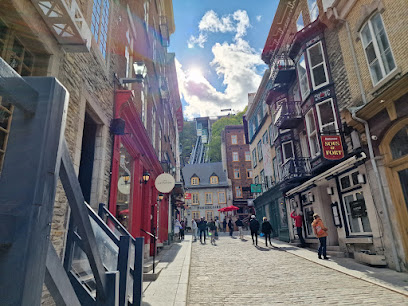
Shop Our Lady of Quebec
Discover authentic local gifts at Shop Our Lady of Quebec, where unique artisan crafts meet the heart of Quebec's culture.
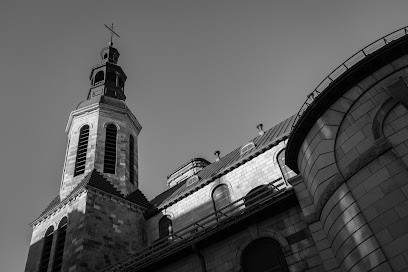
La Boutique du Musée
Discover unique gifts and local crafts at La Boutique du Musée, the perfect stop for souvenirs in the heart of Québec City.
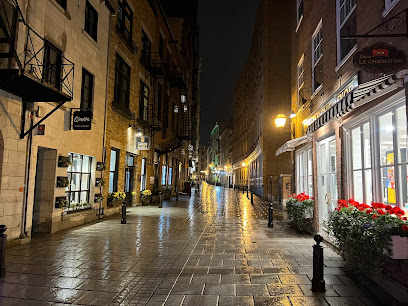
Essential bars & hidden hideouts
Pub St-Patrick
Discover the lively atmosphere and authentic Irish cuisine at Pub St-Patrick in the heart of Québec City, where culture and flavor meet.
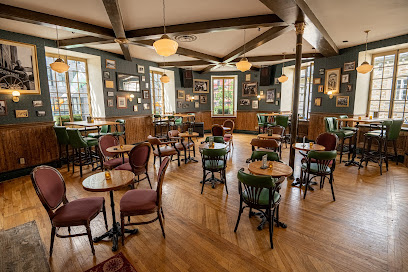
Pub St-Alexandre
Experience the lively atmosphere of Pub St-Alexandre in Quebec City, where craft beer meets delicious food and live entertainment.
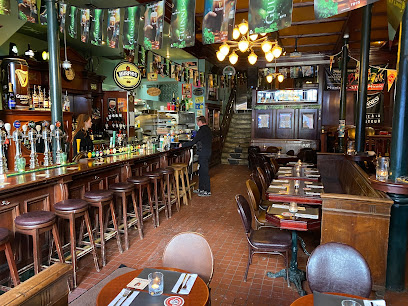
Pub L'Oncle Antoine
Discover the vibrant atmosphere and local flavors at Pub L'Oncle Antoine, a must-visit pub in the heart of Quebec City.
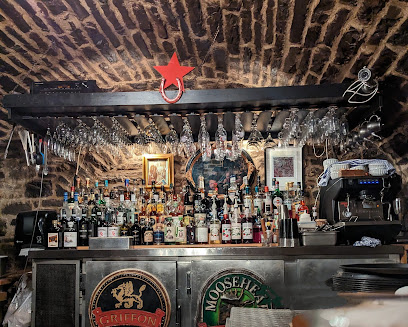
Q-DE-SAC RESTO PUB
Discover the ultimate pub experience at Q-DE-SAC RESTO PUB in Québec City, where delicious flavors and a vibrant atmosphere await.
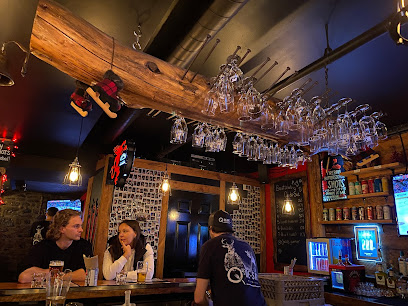
Pub Borgia
Discover the lively ambiance and local flavors at Pub Borgia, a must-visit pub in the heart of Québec City with a fantastic drink selection.
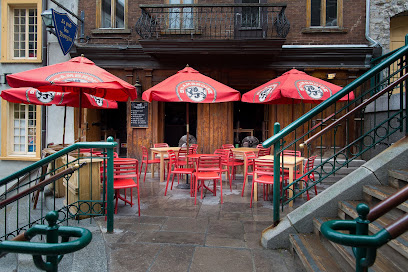
Bar Ste-Angèle
Discover the heart of Québec City's nightlife at Bar Ste-Angèle, a vibrant bar and jazz club featuring live music and a welcoming atmosphere.
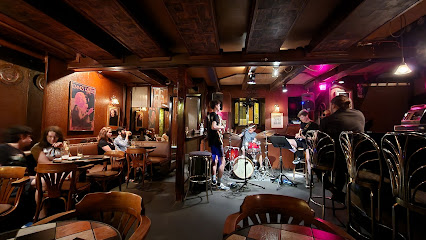
Bar Les Yeux Bleus
Experience the vibrant nightlife at Bar Les Yeux Bleus in Quebec City, where craft cocktails meet an energetic atmosphere and unforgettable DJ performances.
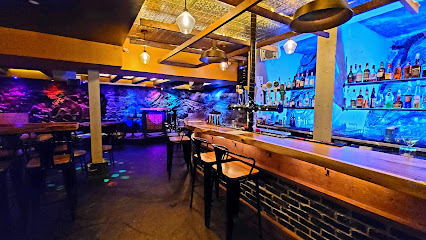
Bar 1608
Experience the charm of Bar 1608 in Fairmont Le Château Frontenac, where exquisite cocktails meet stunning views of the St. Lawrence River.
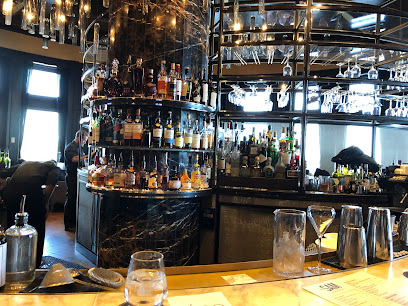
Bar Artefact
Savor the essence of Quebec with local meats and a welcoming atmosphere at Bar Artefact, a top grill bar in Quebec City.
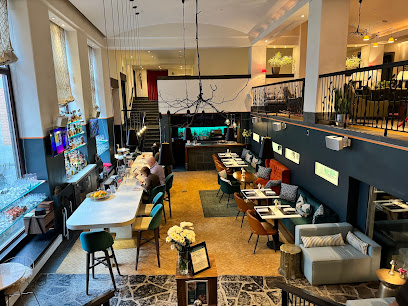
Bar le Fou du Roy
Discover the vibrant atmosphere and extensive drink selection at Le Fou du Roy, a must-visit bar in the heart of Quebec City.
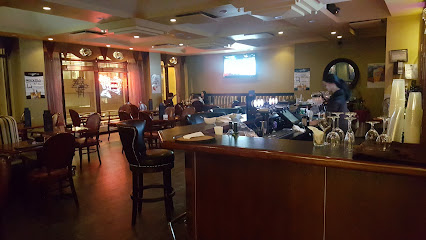
Local Phrases
-
- HelloBonjour
[bon-zhoor] - GoodbyeAu revoir
[oh ruh-vwahr] - YesOui
[wee] - NoNon
[nohn] - Please/You're welcomeS'il vous plaît
[seel voo pleh] - Thank youMerci
[mehr-see] - Excuse me/SorryExcusez-moi/Désolé
[ex-kew-zay mwa/day-zoh-lay] - How are you?Comment ça va?
[koh-mohn sah vah] - Fine. And you?Bien. Et vous?
[byen. ay voo] - Do you speak English?Parlez-vous anglais?
[par-lay voo ahn-glay] - I don't understandJe ne comprends pas
[zhuh nuh kohm-prahnd pah]
- HelloBonjour
-
- I'd like to see the menu, pleaseJe voudrais voir le menu, s'il vous plaît
[zhuh voo-dray vwahr luh muh-nyoo, seel voo pleh] - I don't eat meatJe ne mange pas de viande
[zhuh nuh mahnzh pah duh vee-ahnd] - Cheers!Santé!
[sahn-tay] - I would like to pay, pleaseJe voudrais payer, s'il vous plaît
[zhuh voo-dray pay-yay, seel voo pleh]
- I'd like to see the menu, pleaseJe voudrais voir le menu, s'il vous plaît
-
- Help!Au secours!
[oh suh-koor] - Go away!Allez-vous en!
[ah-lay voo zahn] - Call the Police!Appelez la police!
[ah-peh-lay lah poh-lees] - Call a doctor!Appelez un médecin!
[ah-peh-lay uh may-dsahn] - I'm lostJe suis perdu(e)
[zhuh swee pair-doo] - I'm illJe suis malade
[zhuh swee mah-lahd]
- Help!Au secours!
-
- I'd like to buy...Je voudrais acheter...
[zhuh voo-dray zah-shay] - I'm just lookingJe regarde juste
[zhuh ruh-gahrd zhuhst] - How much is it?Combien ça coûte?
[kohm-byen sah koot] - That's too expensiveC'est trop cher
[say troh shair] - Can you lower the price?Pouvez-vous baisser le prix?
[poo-vay voo bay-say luh pree]
- I'd like to buy...Je voudrais acheter...
-
- What time is it?Quelle heure est-il?
[kell uhr ay-teel] - It's one o'clockIl est une heure
[eel ayt oon uhr] - Half past (10)Dix heures et demie
[dees uhr ay duh-mee] - MorningMatin
[mah-tan] - AfternoonAprès-midi
[ah-pray mee-dee] - EveningSoir
[swah] - YesterdayHier
[ee-yehr] - TodayAujourd'hui
[oh-zhoor-dwee] - TomorrowDemain
[duh-mahn] - 1Un
[uhn] - 2Deux
[duh] - 3Trois
[trwah] - 4Quatre
[kah-truh] - 5Cinq
[sank] - 6Six
[sees] - 7Sept
[sept] - 8Huit
[weet] - 9Neuf
[nuhf] - 10Dix
[dees]
- What time is it?Quelle heure est-il?
-
- Where's a/the...?Où est un/le...?
[oo ay uh/luh] - What's the address?Quelle est l'adresse?
[kell ay lah-dress] - Can you show me (on the map)?Pouvez-vous me montrer (sur la carte)?
[poo-vay voo muh mohn-tray (soor lah kart)] - When's the next (bus)?Quand est le prochain (bus)?
[kahnd ay luh proh-shang (boos)] - A ticket (to ....)Un billet (pour ....)
[uhn bee-yay (poor)]
- Where's a/the...?Où est un/le...?
History of Old Quebec
-
Old Quebec, originally known as Stadacona, was founded in 1608 by Samuel de Champlain. This strategic location along the St. Lawrence River was chosen for its advantageous position for trade and defense. The settlement quickly became a vital hub for French colonization in North America, laying the groundwork for the region's development.
-
The mid-18th century saw Old Quebec at the center of the French and Indian War, a conflict between British and French colonial powers. The pivotal Battle of Quebec in 1759, led by General James Wolfe, resulted in the British capture of the city. This marked a significant turning point in North American history, leading to the eventual cession of New France to Britain in 1763.
-
Following the British conquest, Old Quebec became a melting pot of cultures. The Quebec Act of 1774 allowed the French-speaking population to maintain their language and customs, fostering a unique cultural identity that persists today. The preservation of Old Quebec's architecture and traditions reflects this blend of French and British influences.
-
In 1985, Old Quebec was designated a UNESCO World Heritage Site, recognized for its well-preserved colonial architecture and its historical significance. This designation underscores the neighborhood's role as a cultural landmark, showcasing examples of 17th- and 18th-century fortifications, churches, and public buildings.
-
Today, Old Quebec serves as a vibrant cultural and tourist destination. The neighborhood hosts numerous festivals, such as the Winter Carnival and Festival d'été de Québec, celebrating the region's rich artistic heritage. Streets like Rue du Petit-Champlain and Place Royale reflect the living history of the area, drawing visitors to experience the charm and legacy of this historic neighborhood.
Old Quebec Essentials
-
Old Quebec is easily accessible from various parts of Quebec City. If you're arriving by train, Via Rail operates services to Quebec City, with a short taxi or bus ride to the Old Town. The city’s main bus terminal, located downtown, connects to Old Quebec via local buses (routes 1, 11, and 21). If you're flying into Jean Lesage International Airport, you can take a shuttle service or taxi directly to Old Quebec, which takes about 30 minutes.
-
Old Quebec is compact and best explored on foot. The cobblestone streets are pedestrian-friendly, but be prepared for some steep hills. For those with mobility issues, consider using the funicular that links the upper and lower towns. Public buses are available for longer distances, while bike rentals are popular in warmer months. The city also offers guided bike tours for a unique perspective of the area.
-
Old Quebec is generally a safe area for tourists, but it’s wise to take precautions. While violent crime is rare, petty theft can occur, particularly in crowded tourist spots. Avoid poorly lit areas at night, especially around the edges of the Old Town. Areas outside of Old Quebec, such as parts of Saint-Roch, can have higher crime rates, so remain vigilant.
-
In case of emergency, dial 911 for police, fire, or medical assistance. The nearest hospital is the CHU de Québec-Université Laval, which can be reached by taxi. Keep a copy of important documents, and consider purchasing travel insurance for additional peace of mind. Familiarize yourself with the location of the nearest pharmacy for minor health issues.
-
Fashion: Do dress appropriately for the weather and wear comfortable shoes for walking. Don't wear overly casual or beach attire while visiting churches or upscale restaurants. Religion: Do respect the customs of religious sites, such as covering shoulders. Don't take photographs where prohibited. Public Transport: Do be polite and offer your seat to elderly passengers. Don't engage in loud conversations. Greetings: Do greet locals with a friendly 'Bonjour' and a smile. Avoid discussing politics or sensitive topics. Eating & Drinking: Do try local specialties like poutine and tourtière. Don't waste food or refuse hospitality, as it may be seen as impolite.
-
To experience Old Quebec like a local, visit the Marché du Vieux-Port for fresh produce and local crafts. Explore the lesser-known streets and alleys for hidden gems like boutiques and cafés. Attend local festivals, such as Winter Carnival or the Quebec City Summer Festival, to immerse yourself in the culture. Try to learn a few basic French phrases, as locals appreciate the effort.
-
Quebec has a rich cultural heritage, and showing respect for its traditions is appreciated. Do participate in local customs, like saying 'Merci' and 'S'il vous plaît.' When dining, it's customary to wait for the host to start eating before you begin. Tipping is customary at restaurants, usually around 15-20% of the bill.
Nearby Cities to Old Quebec
-
Things To Do in Halifax
-
Things To Do in Montreal
-
Things To Do in Waterville
-
Things To Do in Stowe
-
Things To Do in Bangor
-
Things To Do in Augusta
-
Things To Do in Burlington
-
Things To Do in Montpelier
-
Things To Do in Lewiston
-
Things To Do in Camden
-
Things To Do in Brunswick
-
Things To Do in Rockland
-
Things To Do in Middlebury
-
Things To Do in Lake Placid
-
Things To Do in Hanover













